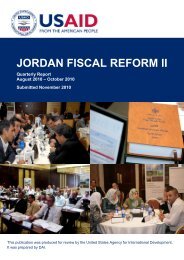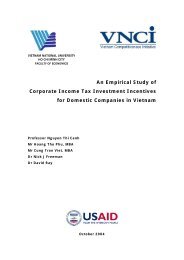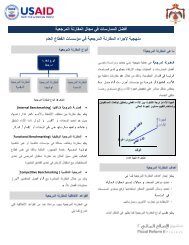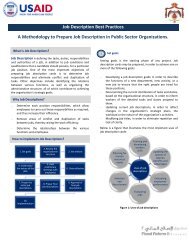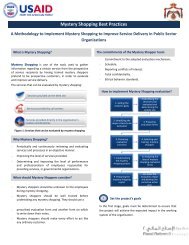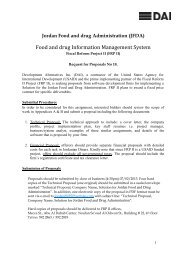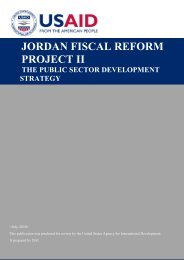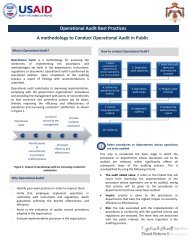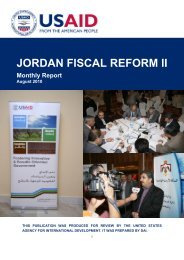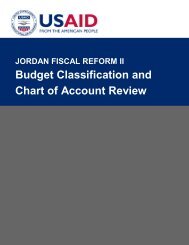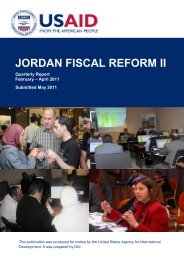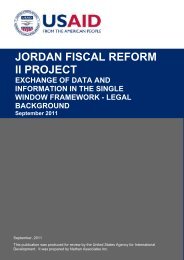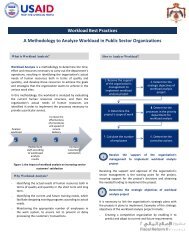Integrated Financial Management Information Systems: A ... - Frp2.org
Integrated Financial Management Information Systems: A ... - Frp2.org
Integrated Financial Management Information Systems: A ... - Frp2.org
You also want an ePaper? Increase the reach of your titles
YUMPU automatically turns print PDFs into web optimized ePapers that Google loves.
Testing and training<br />
Corruption<br />
As each issue is addressed, so a Pandora’s box of unknowns is opened for each, as each country<br />
situation presents challenges that, if ignored, decreases the potential for successful IFMIS<br />
implementation.<br />
Some of the above issues are discussed briefly below to arm the reader with a basic understanding of<br />
the dimension of the challenges that can be faced. How much attention to devote to each issue<br />
depends on a variety of factors, including existing conditions, donors’ time horizon, and other factors.<br />
LEGAL FRAMEWORK<br />
When designing a government IFMIS, it is critical to review the legal and regulatory framework and<br />
assess the necessary changes to the overall framework for public financial management, including the<br />
deployment and reporting of resources. Changing legal frameworks is not a simple task, but IFMIS<br />
implementation teams must carefully address legal and regulatory requirements if the IFMIS is to be<br />
successful and sustainable.<br />
Typically, the legislative framework—whether enshrined in a Constitution or in a series of public<br />
finance, budget and accounting laws and regulations—should include:<br />
(i) the roles and responsibilities of the treasury, ministry of finance and other agencies<br />
involved in controlling and managing public finances,<br />
(ii) provisions on the receipt and custody of government funds, the annual process,<br />
submission and approval of estimates and procedures for release of funds,<br />
(iii) the basis of accounting and the form and procedures for presentation of annual accounts,<br />
and<br />
(iv) provisions on asset management, borrowing and investment. 2<br />
Attention will also need to be given to statutory review and reporting requirements, such as<br />
publication of the budget, external audits, and reporting to international bodies such as the IMF.<br />
Strong political support for public finance reform can help move legal reforms forward, but even with<br />
this support changing national law takes time, a luxury that most IFMIS projects, donor-funded or<br />
not, do not have. Yet the legislative reform process need not stall IFMIS implementation. It is very<br />
important to understand how the legal system in place functions, and then to build an IFMIS that<br />
responds not only to its requirements, but also has the adaptability to respond to eventual changes in<br />
the legal framework. Off-the-shelf tools can provide this flexibility.<br />
BUSINESS PROCESS RE-ENGINEERING<br />
<strong>Information</strong> technology is vastly changing the way information is captured, summarized and<br />
communicated, and the benefits of these technological advances should not be underestimated.<br />
However, the introduction of a new IFMIS system should not just be seen as a technology fix. Simply<br />
automating inefficient processes will not necessarily make them any more efficient; nor will<br />
automating tasks that did not need to be carried out in the first place. Rather, an IFMIS<br />
implementation should be seen as a public finance reform that affects how things are done across<br />
2 Diamond and Khemani (2005), p. 13.<br />
8 INTEGRATED FINANCIAL MANAGEMENT INFORMATION SYSTEMS: A PRACTICAL GUIDE



